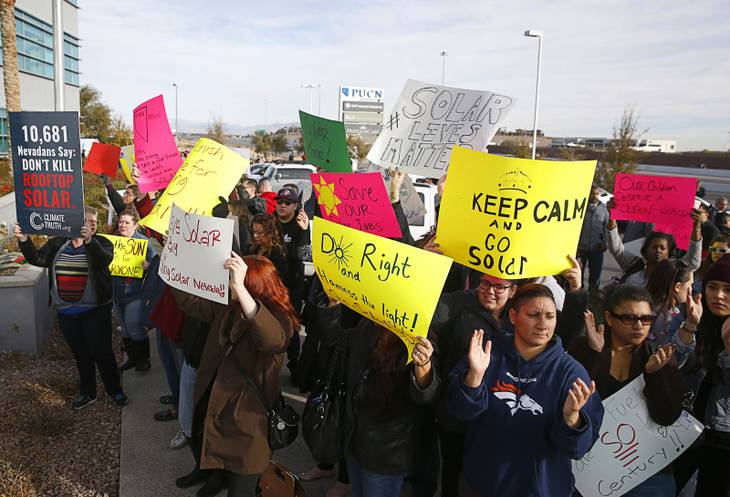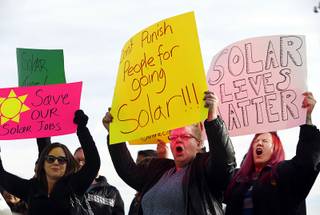After weeks of pushback from solar advocates, the Public Utilities Commission will meet Monday to decide whether to grant additional testimony on one narrow but contentious issue: whether certain solar customers should be allowed to keep their old electricity rates from before their bills increased Jan. 1.
Following a controversial decision in December to increase bills for solar customers, the commission received requests from several parties asking that it revisit its ruling. The bill hike for solar customers comprised an increased fixed charge, with a slight reduction in basic electricity rates, and a reduction in the value of credits they earn for generating excess energy.
The new rates were implemented Jan. 1 and will be phased in over the next four years.
Among the most contentious issues surrounding the new rates was its broad application to all solar customers. The rates even applied to early adopters who invested in the technology before a cap was reached in August, something NV Energy, which is regulated by the commission, had not proposed.
Solar advocates argued that this amounted to a bait-and-switch in policy.
Several Nevada politicians also spoke out against the omission of a grandfathering clause in the new rates set by the three-member panel. In a letter responding to a constituent, Rep. Joe Heck wrote: “There should be a grandfather clause that protects the rates of existing residential solar users.”
Now, it appears as if the commission is taking the initial steps to revisit the issue.
According to a draft order, which can still be amended before the full commission votes on it during a meeting Monday, the quasi-judicial body would gather and weigh additional testimony on the issue.
Before holding a hearing in February, the commission would collect comments on the grandfathering issue from various parties, including the Bureau of Consumer Protection, the agency that acts as the representative of ratepayers in this matter and filed the request for a rehearing. The bureau initially said in a hearing last year that early adopters — those who were approved for rooftop solar before a limit for solar customers was reached — ought to be grandfathered for at least eight to 10 years.
The commission is asking the bureau to substantiate this claim and for all relevant parties to comment on the issue. The draft order said there was not enough evidence on record to evaluate whether the potential benefits of grandfathering outweighed the impact on other ratepayers.
“The commission believes there is inadequate evidence upon which to base a decision to implement a grandfathering program, especially in light of the substantial subsidy that such a program would preserve,” the draft order reads. “To consider grandfathering (early adopters), the commission must be provided with the additional information that was conspicuously absent from the testimony of the parties who supported the concept of grandfathering in this case.”
The commission has said the new rates are necessary to ensure solar customers, who buy less electricity and avoid paying some of NV Energy’s fixed fees, are not shifting costs to other ratepayers.
Solar advocates argue the commission’s calculation fails to factor the benefits of solar to all ratepayers, which include effects on the environment or NV Energy’s decreased need for infrastructure.
The proposed order asks parties to clarify several points on grandfathering, including who it should apply to and what, if any, information customers received about the potential that their rates could change. It also asks the parties to answer a number of questions about how grandfathering would advance legislative priorities as they relate to supporting the state's economic development, the encouragement of a sustainable solar industry in Nevada and private investment in renewable energy.
If commissioners adopt the proposed order Monday, the commission will have a hearing Feb. 8.
Apart from the grandfathering issue, the draft order does not address any other points in the parties’ requests to revisit the rates. Other issues include the commission’s calculus in the new rate design.

